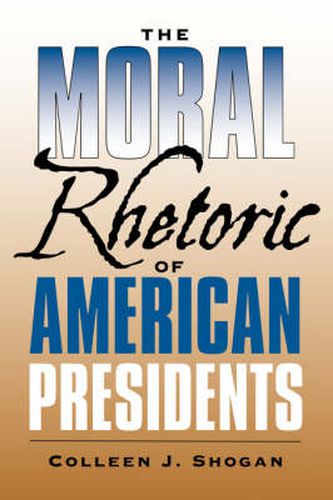Readings Newsletter
Become a Readings Member to make your shopping experience even easier.
Sign in or sign up for free!
You’re not far away from qualifying for FREE standard shipping within Australia
You’ve qualified for FREE standard shipping within Australia
The cart is loading…






This title is printed to order. This book may have been self-published. If so, we cannot guarantee the quality of the content. In the main most books will have gone through the editing process however some may not. We therefore suggest that you be aware of this before ordering this book. If in doubt check either the author or publisher’s details as we are unable to accept any returns unless they are faulty. Please contact us if you have any questions.
Although sometimes decried by pundits, George W. Bush’s use of moral and religious rhetoric is far from unique in the American presidency. In
The Moral Rhetoric of American Presidents , Colleen J. Shogan astutely analyzes the president’s role as the nation’s moral spokesman and demonstrates that moral and religious rhetoric is a strategic tool presidents can use to enhance their constitutional authority. Shogan employs content analysis of the inaugural and annual addresses of all the presidents from George Washington through George W. Bush. This quantitative evidence shows that while presidents of both parties have used moral and religious arguments, the frequency has fluctuated considerably and the language has become increasingly detached from relevant policy arguments. Shogan explores the political effects of the rhetorical choices presidents make through nine historical cases: Presidents Washington, Jefferson, Madison, Buchanan, Lincoln, Theodore Roosevelt, Kennedy, Lyndon Johnson, and Carter. Shogan highlights the specific political circumstances that encourage or discourage the use of moral rhetoric and analyzes several dilemmas of governance instigated by George W. Bush’s persistent devotion to moral and religious argumentation. This paperback edition includes a new afterword in which Shogan applies her analysis to understanding the role of Bush’s moral rhetoric in the 2006 Congressional elections. She considers the change in his addresses after his party’s midterm losses and, surveying the likely candidates for the 2008 presidential election, argues that they will need to ascertain how to maximize the strategic utility of moral and religious rhetoric.
$9.00 standard shipping within Australia
FREE standard shipping within Australia for orders over $100.00
Express & International shipping calculated at checkout
This title is printed to order. This book may have been self-published. If so, we cannot guarantee the quality of the content. In the main most books will have gone through the editing process however some may not. We therefore suggest that you be aware of this before ordering this book. If in doubt check either the author or publisher’s details as we are unable to accept any returns unless they are faulty. Please contact us if you have any questions.
Although sometimes decried by pundits, George W. Bush’s use of moral and religious rhetoric is far from unique in the American presidency. In
The Moral Rhetoric of American Presidents , Colleen J. Shogan astutely analyzes the president’s role as the nation’s moral spokesman and demonstrates that moral and religious rhetoric is a strategic tool presidents can use to enhance their constitutional authority. Shogan employs content analysis of the inaugural and annual addresses of all the presidents from George Washington through George W. Bush. This quantitative evidence shows that while presidents of both parties have used moral and religious arguments, the frequency has fluctuated considerably and the language has become increasingly detached from relevant policy arguments. Shogan explores the political effects of the rhetorical choices presidents make through nine historical cases: Presidents Washington, Jefferson, Madison, Buchanan, Lincoln, Theodore Roosevelt, Kennedy, Lyndon Johnson, and Carter. Shogan highlights the specific political circumstances that encourage or discourage the use of moral rhetoric and analyzes several dilemmas of governance instigated by George W. Bush’s persistent devotion to moral and religious argumentation. This paperback edition includes a new afterword in which Shogan applies her analysis to understanding the role of Bush’s moral rhetoric in the 2006 Congressional elections. She considers the change in his addresses after his party’s midterm losses and, surveying the likely candidates for the 2008 presidential election, argues that they will need to ascertain how to maximize the strategic utility of moral and religious rhetoric.